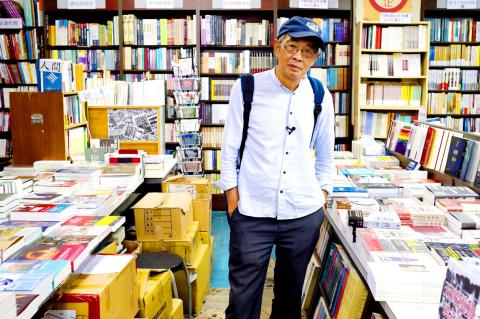A Hong Kong bookseller, who had disappeared into Chinese custody for half a year, yesterday said that he has fled to Taiwan after the financial hub announced plans to approve extraditions to China.
Lam Wing-kei (林榮基), the former manager of Hong Kong-based Causeway Bay Books (銅鑼灣圖書), was one of five publishers selling gossip-filled tomes on China’s leaders who vanished in late 2015, resurfacing in Chinese custody and making televised confessions.
He was allowed back to Hong Kong in June 2016 on condition that he pick up a hard drive listing the bookstore’s customers and return to China.

Photo: Sam Yeh / AFP
Instead, he skipped bail and went public with explosive testimony detailing how he was blindfolded by police after crossing the border into Shenzhen, China, and spent months being interrogated.
Following his ordeal, the 64-year-old had previously said that he wanted to move to Taiwan, which does not have an extradition agreement with China.
He yesterday said that his plans were sped up after Hong Kong’s government this year announced controversial plans to allow extraditions to China.
“Right now Hong Kong is not safe for me anymore,” he told reporters in Taipei, saying that he had flown to the capital the day before.
Lam said that he was “enjoying the air of freedom and reading some free books,” adding that he hopes to work for a friend and is in talks to open a bookstore in Taiwan.
Asked for comment, Mainland Affairs Council Deputy Minister Chiu Chui-cheng (邱垂正) said that the government has approved Lam to stay a month in Taiwan, adding that he would need to apply in accordance with the law if he plans to stay long term.
As Lam skipped bail, he is still technically wanted in China. Hong Kong currently has no extradition agreement with China.
The territory has a separate legal system through the “one country, two systems” deal struck between Britain and China.
Historically, the territory has balked at Chinese extradition requests because of the opacity of China’s criminal justice system and its liberal use of the death penalty.
However, earlier this year Hong Kong’s government announced plans to overhaul its extradition rules, allowing the transfer of fugitives to China on a “case-by-case basis” for the first time.
The legislation has been winding its way through the Hong Kong Legislative Council.
Lam said that he felt he could not take the risk of staying.
“You don’t know what kind of excuses or charges they will use to put you on the wanted list,” he said, adding that the extradition law “puts every Hong Konger in a very dangerous position.”
He said that he felt Taiwan was a safer bet, because it “really has rule of law.”
The planned extradition changes in Hong Kong have sparked large protests and mounting alarm within the territory’s business and legal communities, which fear that it would hammer the financial hub’s international appeal and tangle people up in China’s opaque courts.
A protest is planned for tomorrow in Hong Kong.
Additional reporting by staff writer

NATIONAL SECURITY THREAT: An official said that Guan Guan’s comments had gone beyond the threshold of free speech, as she advocated for the destruction of the ROC China-born media influencer Guan Guan’s (關關) residency permit has been revoked for repeatedly posting pro-China content that threatens national security, the National Immigration Agency said yesterday. Guan Guan has said many controversial things in her videos posted to Douyin (抖音), including “the red flag will soon be painted all over Taiwan” and “Taiwan is an inseparable part of China,” while expressing hope for expedited “reunification.” The agency received multiple reports alleging that Guan Guan had advocated for armed reunification last year. After investigating, the agency last month issued a notice requiring her to appear and account for her actions. Guan Guan appeared as required,

A strong cold air mass is expected to arrive tonight, bringing a change in weather and a drop in temperature, the Central Weather Administration (CWA) said. The coldest time would be early on Thursday morning, with temperatures in some areas dipping as low as 8°C, it said. Daytime highs yesterday were 22°C to 24°C in northern and eastern Taiwan, and about 25°C to 28°C in the central and southern regions, it said. However, nighttime lows would dip to about 15°C to 16°C in central and northern Taiwan as well as the northeast, and 17°C to 19°C elsewhere, it said. Tropical Storm Nokaen, currently

‘NATO-PLUS’: ‘Our strategic partners in the Indo-Pacific are facing increasing aggression by the Chinese Communist Party,’ US Representative Rob Wittman said The US House of Representatives on Monday released its version of the Consolidated Appropriations Act, which includes US$1.15 billion to support security cooperation with Taiwan. The omnibus act, covering US$1.2 trillion of spending, allocates US$1 billion for the Taiwan Security Cooperation Initiative, as well as US$150 million for the replacement of defense articles and reimbursement of defense services provided to Taiwan. The fund allocations were based on the US National Defense Authorization Act for fiscal 2026 that was passed by the US Congress last month and authorized up to US$1 billion to the US Defense Security Cooperation Agency in support of the

PAPERS, PLEASE: The gang exploited the high value of the passports, selling them at inflated prices to Chinese buyers, who would treat them as ‘invisibility cloaks’ The Yilan District Court has handed four members of a syndicate prison terms ranging from one year and two months to two years and two months for their involvement in a scheme to purchase Taiwanese passports and resell them abroad at a massive markup. A Chinese human smuggling syndicate purchased Taiwanese passports through local criminal networks, exploiting the passports’ visa-free travel privileges to turn a profit of more than 20 times the original price, the court said. Such criminal organizations enable people to impersonate Taiwanese when entering and exiting Taiwan and other countries, undermining social order and the credibility of the nation’s